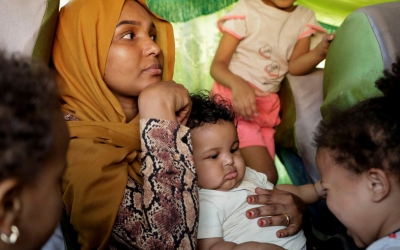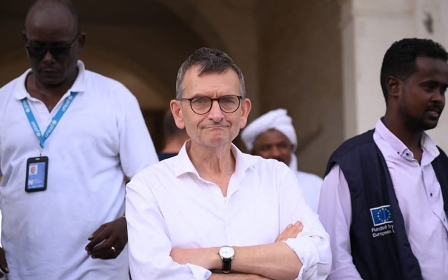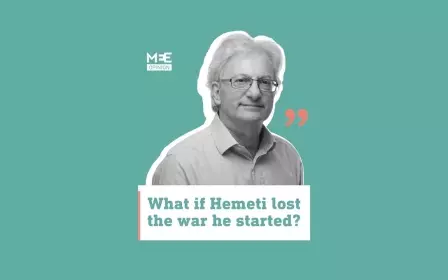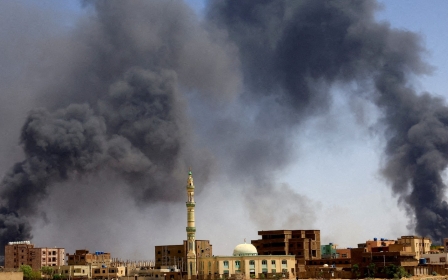Egypt demands visas for all Sudanese after detecting 'unlawful activities'
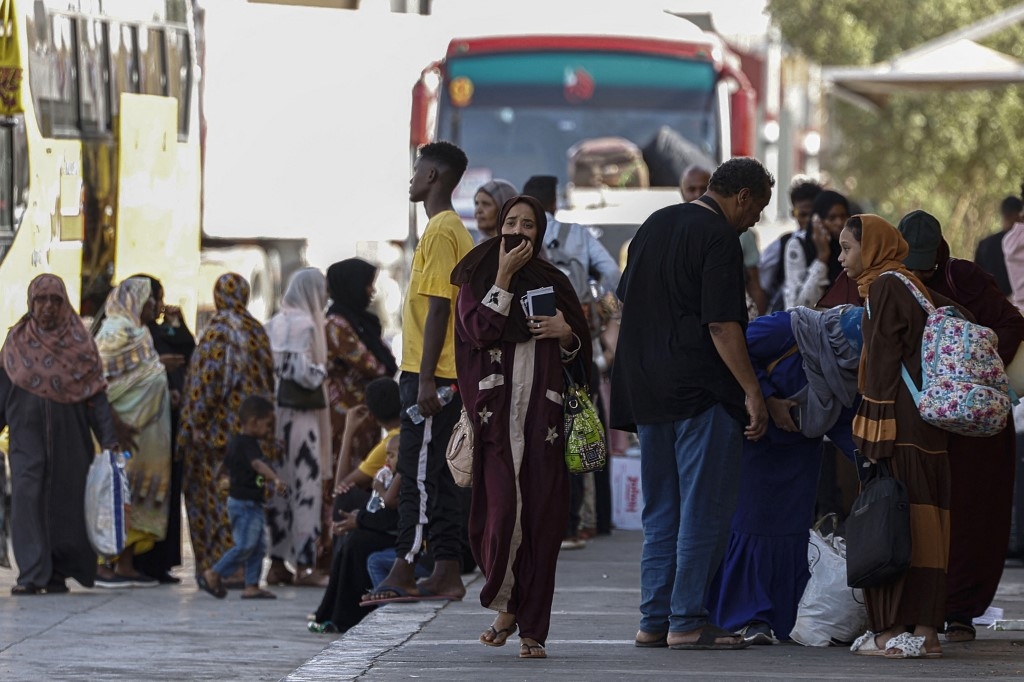
Egypt instituted a new policy on Saturday requiring all Sudanese people entering the country to obtain visas beforehand, after detecting "unlawful activities", including the issuance of fraudulent visas, according to Foreign Ministry Spokesman Ahmed Abu Zeid.
The decision was a reversal of a longstanding exemption for children, women and elderly men.
More than 200,000 Sudanese nationals have entered Egypt since fighting between the Sudanese army and the paramilitary Rapid Support Forces began in April, Abu Zeid told Reuters.
According to the UNHCR, that number stood at 83,758.
The ongoing war in Sudan, which erupted on 15 April, has seen tens of thousands of civilians flee to neighbouring countries. Most of them made their way to Egypt, which had been allowing women, children and the elderly to cross, albeit slowly. But many men aged 16-49 were turned back.
New MEE newsletter: Jerusalem Dispatch
Sign up to get the latest insights and analysis on Israel-Palestine, alongside Turkey Unpacked and other MEE newsletters
The new ruling will now require all Sudanese nationals require a visa.
'Stress and exhaustion'
Last month, before the change of policy, Middle East Eye had spoken to people in Sudan trying to get visas.
Lugain Mahmoud, 28, along with her husband and his 19-year-old brother were among thousands stranded outside the Egyptian consulate in Wadi Halfa, north of Sudan.
Since they fled Khartoum on 26 April, Mahmoud's brother-in-law had suffered many diabetic coma episodes, from "stress, exhaustion and the hard circumstances of the trip and staying in Halfa", she told MEE.
"I am not planning to leave without my husband. What if they don't grant him a visa for one reason or another? We will be stuck on two different sides with no knowledge of how or when we will be reunited again," Mahmoud said.
She added that, while her mother and younger sisters had crossed the border to Egypt and would need assistance in settling in, she could not leave her husband behind.
Mahmoud and another Sudanese man waiting outside the Egyptian consulate told MEE that people in Halfa were sleeping on the ground, and many others had run out of money waiting to receive their visas.
"Halfa is a small city with about 5,000 residents. Around 15,000 people have arrived over the past few days, and there are no accommodations for all of us. We sleep in mosques, streets and schools," said the Sudanese man, who preferred to remain anonymous.
UN urges 'non-discriminatory access'
In an open letter, many Sudanese activists and writers had urged the Egyptian government and UN to ease the entry of Sudanese refugees fleeing war, including men aged 16-49, under the 1951 Refugee Convention and the 1967 Protocol relating to the status of refugees.
The protocol, signed by Cairo, stated that "no one shall expel or return a refugee against his or her will, in any manner whatsoever, to a territory where he or she fears threats to life or freedom".
UNHCR's external relations officer in Egypt, Christine Beshay, told MEE that the UN emphasised the importance of access to territory and asylum to anyone fleeing violence and conflict, regardless of age or gender.
'UNHCR… advocates all states to ensure access to territory and protection for all those fleeing the conflict regardless of their age or gender'
- Christine Beshay, UNHCR
"[UNHCR] has been urging all countries to allow civilians fleeing Sudan non-discriminatory access to their territories," she said.
"UNHCR is in constant dialogue with the authorities in Egypt and neighbouring countries, and advocates all states to ensure access to territory and protection for all those fleeing the conflict regardless of their age or gender."
On 8 June, the United Nations Sudan envoy Volker Perthes was declared persona non grata by Sudan's foreign ministry after tensions had been building within Sudanese army circles for months.
According to Sudanese officials aligned with the army, Perthes "advanced the cause" of rival Rapid Support Forces (RSF) commander Mohamed Hamdan Dagalo during negotiations before and after the agreement in December of a framework deal to transition Sudan back to a civilian-led government.
This means the former academic, who has led the UNITAMS mission intended to assist Sudan's transition to civilian government since 2021, has officially been asked to leave the country. Perthes was in Ethiopia when the statement was made and had not been in Sudan for at least a fortnight.
Youssef Ezzat, political adviser to the RSF, told MEE that "there is nothing more between us and Volker than the need to end the Burhan and Islamist coup and return to the political track".
Perthes has yet to comment on the declaration.
Middle East Eye delivers independent and unrivalled coverage and analysis of the Middle East, North Africa and beyond. To learn more about republishing this content and the associated fees, please fill out this form. More about MEE can be found here.


